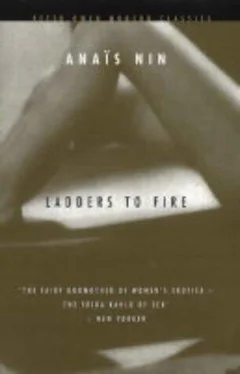Anaïs Nin - Ladders to Fire
Здесь есть возможность читать онлайн «Anaïs Nin - Ladders to Fire» весь текст электронной книги совершенно бесплатно (целиком полную версию без сокращений). В некоторых случаях можно слушать аудио, скачать через торрент в формате fb2 и присутствует краткое содержание. Год выпуска: 2004, ISBN: 2004, Издательство: Peter Owen Limited, Жанр: Классическая проза, Эротические любовные романы, на английском языке. Описание произведения, (предисловие) а так же отзывы посетителей доступны на портале библиотеки ЛибКат.
- Название:Ladders to Fire
- Автор:
- Издательство:Peter Owen Limited
- Жанр:
- Год:2004
- ISBN:9780720611625
- Рейтинг книги:5 / 5. Голосов: 1
-
Избранное:Добавить в избранное
- Отзывы:
-
Ваша оценка:
- 100
- 1
- 2
- 3
- 4
- 5
Ladders to Fire: краткое содержание, описание и аннотация
Предлагаем к чтению аннотацию, описание, краткое содержание или предисловие (зависит от того, что написал сам автор книги «Ladders to Fire»). Если вы не нашли необходимую информацию о книге — напишите в комментариях, мы постараемся отыскать её.
Cities of the Interior
Children of the Albatross
The Four-Chambered Heart
A Spy in the House of Love
Solar Barque
Ladders to Fire — читать онлайн бесплатно полную книгу (весь текст) целиком
Ниже представлен текст книги, разбитый по страницам. Система сохранения места последней прочитанной страницы, позволяет с удобством читать онлайн бесплатно книгу «Ladders to Fire», без необходимости каждый раз заново искать на чём Вы остановились. Поставьте закладку, и сможете в любой момент перейти на страницу, на которой закончили чтение.
Интервал:
Закладка:
This hunger which had inhabited her entire being, which had thinned her blood, transpired through her bones, attacked the roots of her hair, given a fragility to her skin which was never to disappear entirely, had been so enormous that it had marked her whole being and her eyes with an indelible mark. Although her life changed and every want was filled later, this appearance of hunger remained. As if nothing could ever quite fill it. Her being had received no sun, no food, no air, no warmth, no love. It retained open pores of yearning and longing, mysterious spongy cells of absorption. The space between actuality, absolute deprivation, and the sumptuosity of her imagination could never be entirely covered. What she had created in the void, in the emptiness, in the bareness continued to shame all that was offered her, and her large, infinitely blue eyes continued to assert the immensity of her hunger.
This hunger of the eyes, skin, of the whole body and spirit, which made others criminals, robbers, rapers, barbarians, which caused wars, invasions, plundering and murder, in Djuna at the age of puberty alchemized into love.
Whatever was missing she became: she became mother, father, cousin, brother, friend, confidant, guide, companion to all.
This power of absorption, this sponge of receptivity which might have fed itself forever to fill the early want, she used to receive all communication of the need of others. The need and hunger became nourishment. Her breasts, which no poverty had been able to wither, were heavy with the milk of lucidity, the milk of devotion.
This hunger…became love.
While wearing the costume of utter femininity, the veils and the combs, the gloves and the perfumes, the muffs and the heels of femininity, she nevertheless disguised in herself an active lover of the world, the one who was actively roused by the object of his love, the one who was made strong as man is made strong in the center of his being by the softness e, ve. Loving in men and women not their strength but their softness, not their fullness but their hunger, not their plenitude but their needs.
They had made contact then with the deepest aspect of themselves—Djuna with Lillian’s emotional violence and her compassion for this force which destroyed her and hurled her against all obstacles, Lillian with Djuna’s power of clarification. They needed each other. Djuna experienced deep in herself a pleasure each time Lillian exploded, for she herself kept her gestures, her feeling within an outer form, like an Oriental. When Lillian exploded it seemed to Djuna as if some of her violent feeling, so long contained within the forms, were released. Some of her own lightning, some of her own rebellions, some of her own angers. Djuna contained in herself a Lillian too, to whom she had never given a moment’s freedom, and it made her strangely free when Lillian gave vent to her anger or rebellions. But after the havoc, when Lillian had bruised herself, or more seriously mutilated herself (war and explosion had their consequences) then Lillian needed Djuna. For the bitterness, the despair, the chaos submerged Lillian, drowned her. The hurt Lillian wanted to strike back and did so blindly, hurting herself all the more. And then Djuna was there, to remove the arrows implanted in Lillian, to cleanse them of their poison, to open the prison door, to open the trap door, to protect, to give transfusion of blood, and peace to the wounded.
But it was Lillian who was drowning, and it was Djuna who was able always at the last moment to save her, and in her moments of danger, Lillian knew only one thing: that she must possess Djuna.
It was as if someone had proclaimed: I need oxygen, and therefore I will lock some oxygen in my room and live on it.
So Lillian began her courtship.
She brought gifts. She pulled out perfume, and jewelry and clothes. She almost covered the bed with gifts. She wanted Djuna to put all the jewelry on, to smell all the perfumes at once, to wear all her clothes. Djuna was showered with gifts as in a fairy tale, but she could not find in them the fairy tale pleasure. She felt that to each gift was tied a little invisible cord or demand, of exactingness, of debt, of domination. She felt she could not wear all these things and walk away, freely. She felt that with the gifts, a golden spider wove a golden web of possession. Lillian was not only giving away objects, but golden threads woven out of her very own substance to fix and to hold. They were not the fairy tale gifts which Djuna had dreamed of receiving. (She had many dreams of receiving perfume, or receiving fur, or being given blue bottles, lames, etc.) In the fairy tale the giver laid out the presents and then became invisible. In the fairy tales and in the dreams there was no debt, and there was no giver.
Lillian did not become invisible. Lillian became more and more present. Lillian became the mother who wanted to dress her child out of her own substance, Lillian became the lover who wanted to slip the shoes and slippers on the beloved’s feet so she could contain these feet. The dresses were not chosen as Djuna’s dresses, but as Lillian’s choice and taste to cover Djuna.
The night of gifts, begun in gaiety and magnificence, began to thicken. Lillian had put too much of herself into the gifts. It was a lovely night,ttles, lamthe gifts scattered through the room like fragments of Miro’s circus paintings, flickering and leaping, but not free. Djuna wanted to enjoy and she could not. She loved Lillian’s generosity, Lillian’s largeness, Lillian’s opulence and magnificence, but she felt anxiety. She remembered as a child receiving gifts for Christmas, and among them a closed mysterious box gaily festooned with multicolored ribbons. She remembered that the mystery of this box affected her more than the open, exposed, familiar gifts of tea cups, dolls, etc. She opened the box and out of it jumped a grotesque devil who, propelled by taut springs, almost hit her face.
In these gifts, there is a demon somewhere; a demon who is hurting Lillian, and will hurt me, and I don’t know where he is hiding. I haven’t seen him yet, but he is here.
She thought of the old legends, of the knights who had to kill monsters before they could enjoy their love.
No demon here, thought Djuna, nothing but a woman drowning, who is clutching at me… I love her.
When Lillian dressed up in the evening in vivid colors with her ever tinkling jewelry, her face wildly alive, Djuna said to her, “You’re made for a passionate life of some kind.”
She looked like a white negress, a body made for rolling in natural undulations of pleasure and desire. Her vivid face, her avid mouth, her provocative, teasing glances proclaimed sensuality. She had rings under her eyes. She looked often as if she had just come from the arms of a lover. An energy smoked from her whole body.
But sensuality was paralyzed in her. When Djuna sought to show Lillian her face in the mirror, she found Lillian paralyzed with fear. She was impaled on a rigid pole of puritanism. One felt it, like a heavy silver chastity belt, around her soft, rounded body.
She bought a black lace gown like Djuna’s. Then she wanted to own all the objects which carried Djuna’s personality or spirit. She wanted to be clasped at the wrists by Djuna’s bracelet watch, dressed in Djuna’s kind of clothes.
(Djuna thought of the primitives eating the liver of the strong man of the tribe to acquire his strength, wearing the teeth of the elephant to acquire his durability, donning the lion’s head and mane to appropriate his courage, gluing feathers on themselves to become as free as the bird.)
Lillian knew no mystery. Everything was open with her. Even the most ordinary mysteries of women she did not guard. She was open like a man, frank, direct. Her eyes shed lightning but no shadows.
Читать дальшеИнтервал:
Закладка:
Похожие книги на «Ladders to Fire»
Представляем Вашему вниманию похожие книги на «Ladders to Fire» списком для выбора. Мы отобрали схожую по названию и смыслу литературу в надежде предоставить читателям больше вариантов отыскать новые, интересные, ещё непрочитанные произведения.
Обсуждение, отзывы о книге «Ladders to Fire» и просто собственные мнения читателей. Оставьте ваши комментарии, напишите, что Вы думаете о произведении, его смысле или главных героях. Укажите что конкретно понравилось, а что нет, и почему Вы так считаете.












